
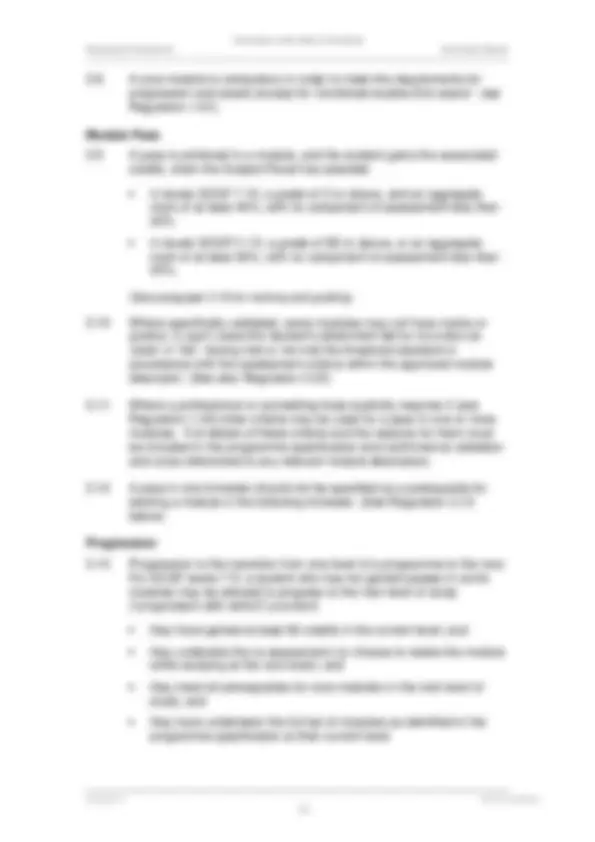
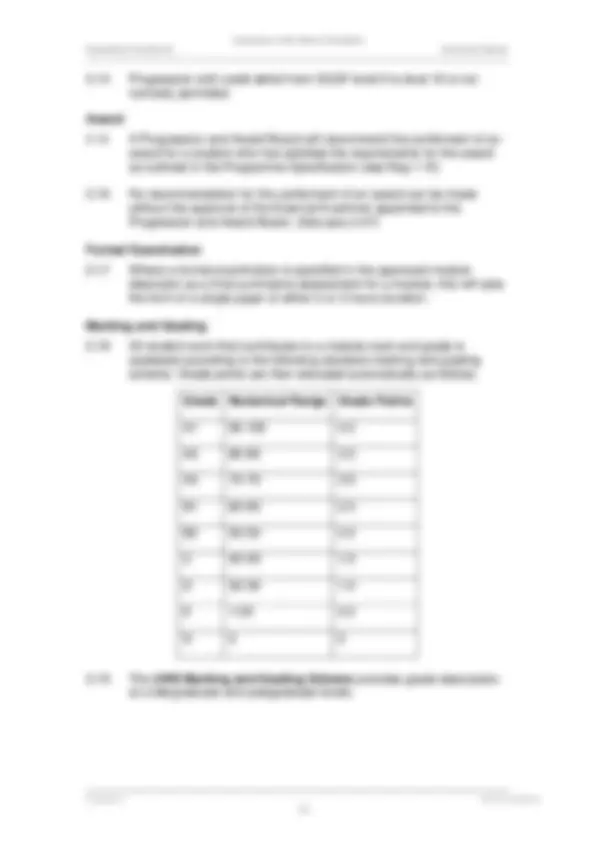
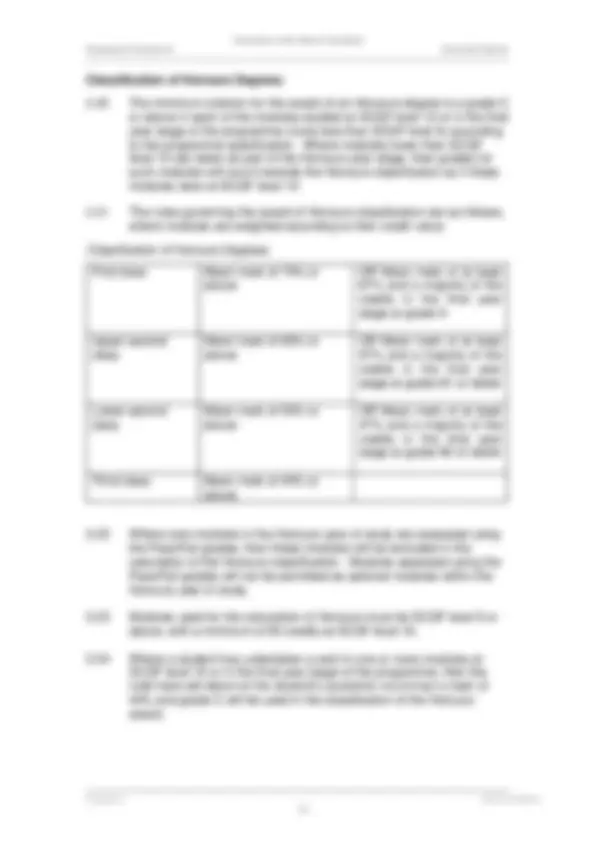
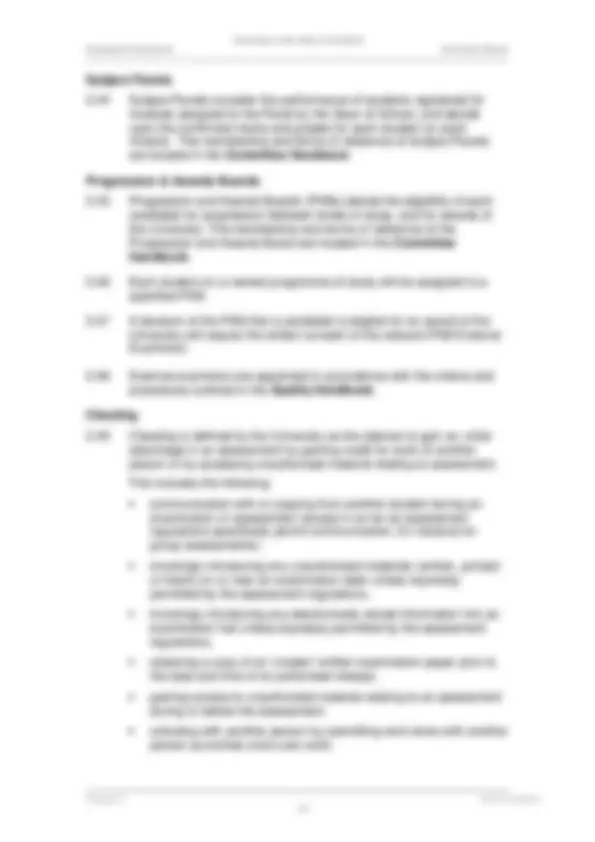
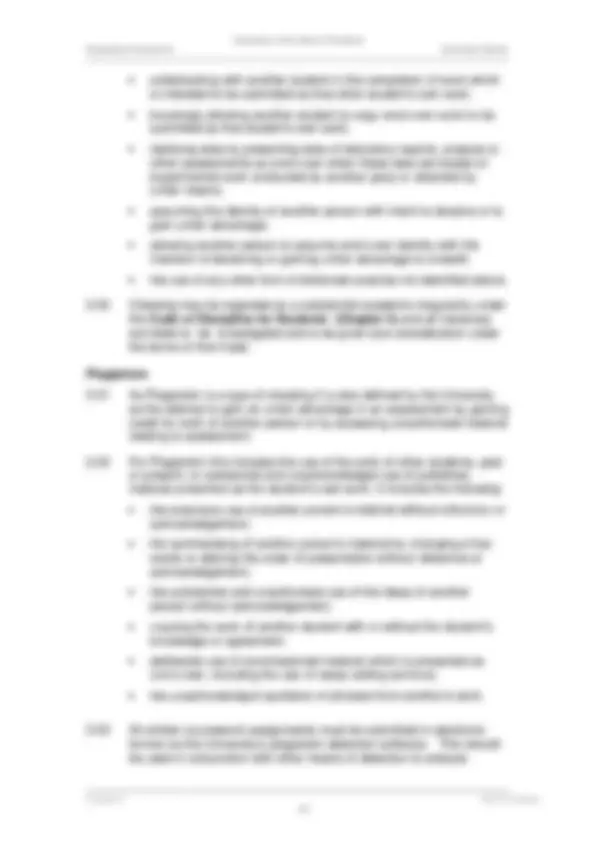
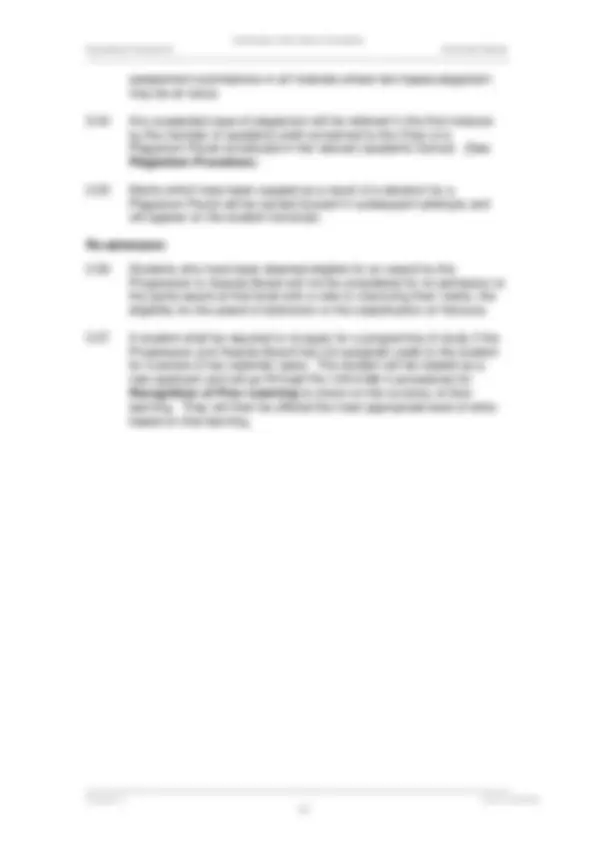


Study with the several resources on Docsity

Earn points by helping other students or get them with a premium plan


Prepare for your exams
Study with the several resources on Docsity

Earn points to download
Earn points by helping other students or get them with a premium plan
Community
Ask the community for help and clear up your study doubts
Discover the best universities in your country according to Docsity users
Free resources
Download our free guides on studying techniques, anxiety management strategies, and thesis advice from Docsity tutors
The University of the West of Scotland's regulatory framework for assessment, covering academic standards, equity, anonymous marking, progression, awards, and misconduct such as cheating and plagiarism. It specifies the rules and procedures for assessment, re-assessment, and compensation for failure, as well as the criteria for awarding distinctions.
Typology: Study notes
1 / 10

This page cannot be seen from the preview
Don't miss anything!







Chapter 3 2018/19 Edition
Regulatory Framework University Senate
Chapter 3 2018/19 Edition
Academic Standards
3.1 Assessment that contributes to the award of academic credit and/or to the award of the degrees, diplomas, certificates and other academic distinctions of the University will relate the achievement of each candidate to the stated academic standards of the University.
3.2 The academic standards of the University will be as stated in the intended learning outcomes of modules and programmes of study, as set out in the relevant module descriptors and programme specifications.
Equity of Assessment
3.3 All students registered for a module will be subject to the application of the same academic standards, rules and procedures with respect to assessment and re-assessment, irrespective of the programme of study or mode of delivery on which they are enrolled.
Anonymous Marking
3.4 Procedures for anonymous marking as outlined in the Assessment Handbook , and approved by Senate will be used in all assessments that contribute to the award of academic credit and/or to the award of the degrees, diplomas, certificates and other academic distinctions of the University except where the nature of the assessment itself renders anonymity impossible to achieve, for example, in placement observations, presentations or practical assessment.
Module Descriptors
3.5 The Module Descriptor for each module shall specify the intended learning outcomes for the module, the range and type of components of assessment and a mechanism of assessment for deciding whether a student should be awarded a pass in the module.
Programme Specification
3.6 The Programme Specification for each programme shall specify the aims of the programme, a mechanism for deciding whether the associated qualification(s) should be awarded, and the requirements for progression from one level of the programme to the next.
3.7 Programme Specifications shall specify what modules are core or optional, in order to meet programme requirements for progression or award.
Regulatory Framework University Senate
Chapter 3 2018/19 Edition
3.14 Progression with credit deficit from SCQF level 9 to level 10 is not normally permitted.
Award
3.15 A Progression and Award Board will recommend the conferment of an award for a student who has satisfied the requirements for the award as outlined in the Programme Specification (see Rag 1.15)
3.16 No recommendation for the conferment of an award can be made without the approval of the External Examiner appointed to the Progression and Award Board. (See para 3.47)
Formal Examination
3.17 Where a formal examination is specified in the approved module descriptor as a final summative assessment for a module, this will take the form of a single paper of either 2 or 3 hours duration.
Marking and Grading
3.18 All student work that contributes to a module mark and grade is assessed according to the following standard marking and grading scheme. Grade points are then allocated automatically as follows:
Grade Numerical Range Grade Points
A1 90-100 4.
A2 80-89 3.
A3 70-79 3.
B1 60-69 2.
B2 50-59 2.
C 40-49 1.
D 30-39 1.
E 1-29 0.
N 0 0
3.19 The UWS Marking and Grading Scheme provides grade descriptors at undergraduate and postgraduate levels.
Regulatory Framework University Senate
Chapter 3 2018/19 Edition
Classification of Honours Degrees
3.20 The minimum criterion for the award of an Honours degree is a grade C or above in each of the modules studied at SCQF level 10 or in the final year stage of the programme (none less than SCQF level 9) according to the programme specification. Where modules lower than SCQF level 10 are taken as part of the Honours year stage, then grades for such modules will count towards the Honours classification as if these modules were at SCQF level 10
3.21 The rules governing the award of Honours classification are as follows, where modules are weighted according to their credit value:
Classification of Honours Degrees
First class Mean mark of 70% or above
OR Mean mark of at least 67% and a majority of the credits in the final year stage at grade A
Upper second class
Mean mark of 60% or above
OR Mean mark of at least 57% and a majority of the credits in the final year stage at grade B1 or better
Lower second class
Mean mark of 50% or above
OR Mean mark of at least 47% and a majority of the credits in the final year stage at grade B2 or better
Third class Mean mark of 40% or above
3.22 Where core modules in the Honours year of study are assessed using the Pass/Fail grades, then these modules will be excluded in the calculation of the Honours classification. Modules assessed using the Pass/Fail grades will not be permitted as optional modules within the Honours year of study.
3.23 Modules used for the calculation of Honours must be SCQF level 9 or above, with a minimum of 90 credits at SCQF level 10.
3.24 Where a student has undertaken a resit in one or more modules at SCQF level 10 or in the final year stage of the programme, then the resit mark will stand on the student’s academic record but a mark of 40% and grade C will be used in the classification of the Honours
Regulatory Framework University Senate
Chapter 3 2018/19 Edition
3.34 Further details and guidance on Joint and Dual awards is provided in the Quality Handbook.
Compensation for Failure in Modules
3.35 Progression and Award Boards cannot apply compensation for failure in any module for any student.
Fit to Sit and Extenuating Circumstances
3.36 In submitting each piece of coursework or completing an examination or class-test, a student is confirming that they are ‘fit to sit’ the assessment and wish that any mark achieved for that coursework, examination or class-test should stand.
3.37 If a student feels that their academic performance has been affected by extenuating circumstances and they are not in a position to complete assessment requirements, they should complete an on-line Extenuating Circumstances (EC) Statement with details of assessment not being completed.
3.38 A student who has undertaken an assessment may withdraw the assessment submission within 48 hours but must submit an extenuating circumstances statement.
Re-assessment
3.39 If a module has not been passed at the first attempt, a student may normally undertake re-assessment for the module. The forms of re- assessment should normally be the same as for the first attempt; but components that were passed at the first attempt cannot be re- assessed, and will be carried forward.
3.40 All assessments and re-assessments for a module must occur within two years of first taking the module.
3.41 Some programmes and modules do not permit re-assessment as a result of requirements by professional, statutory or regulatory bodies.
3.42 The maximum number of attempts at assessment for a module shall be three for undergraduate (SCQF levels 7-10) and two for postgraduate (SCQF level 11-12). A period of authorised interruption shall be discounted from the two year assessment period (see 3.40).
Re-attend
3.43 Where a student is offered the opportunity to re-attend a module, the student will have the entitlement to the same number of attempts at assessment as if taking the module for the first time. A student may only re-attend a module once.
Regulatory Framework University Senate
Chapter 3 2018/19 Edition
Subject Panels
3.44 Subject Panels consider the performance of students registered for modules assigned to the Panel by the Dean of School, and decide upon the confirmed marks and grades for each student on each module. The membership and terms of reference of Subject Panels are located in the Committee Handbook.
Progression & Awards Boards
3.45 Progression and Awards Boards (PABs) decide the eligibility of each candidate for progression between levels of study, and for awards of the University. The membership and terms of reference of the Progression and Awards Board are located in the Committee Handbook.
3.46 Each student on a named programme of study will be assigned to a specified PAB.
3.47 A decision of the PAB that a candidate is eligible for an award of the University will require the written consent of the relevant PAB External Examiners.
3.48 External examiners are appointed in accordance with the criteria and procedures outlined in the Quality Handbook.
Cheating
3.49 Cheating is defined by the University as the attempt to gain an unfair advantage in an assessment by gaining credit for work of another person or by accessing unauthorised material relating to assessment. This includes the following: communication with or copying from another student during an examination or assessment (except in so far as assessment regulations specifically permit communication, for instance for group assessments); knowingly introducing any unauthorised materials (written, printed or blank) on or near an examination desk unless expressly permitted by the assessment regulations; knowingly introducing any electronically stored information into an examination hall unless expressly permitted by the assessment regulations; obtaining a copy of an 'unseen' written examination paper prior to the date and time of its authorised release; gaining access to unauthorised material relating to an assessment during or before the assessment; colluding with another person by submitting work done with another person as entirely one's own work;
Regulatory Framework University Senate
Chapter 3 2018/19 Edition
assessment submissions in all modules where text based plagiarism may be an issue.
3.54 Any suspected case of plagiarism will be referred in the first instance by the member of academic staff concerned to the Chair of a Plagiarism Panel constituted in the relevant academic School. (See Plagiarism Procedure ).
3.55 Marks which have been capped as a result of a decision by a Plagiarism Panel will be carried forward in subsequent attempts and will appear on the student transcript.
Re-admission
3.56 Students who have been deemed eligible for an award by the Progression & Awards Board will not be considered for re-admission to the same award at that level with a view to improving their marks, the eligibility for the award of distinction or the classification of Honours.
3.57 A student shall be required to re-apply for a programme of study if the Progression and Awards Board has not assigned credit to the student for a period of two calendar years. The student will be treated as a new applicant and will go through the University’s procedures for Recognition of Prior Learning to check on the currency of their learning. They will then be offered the most appropriate level of entry based on that learning.